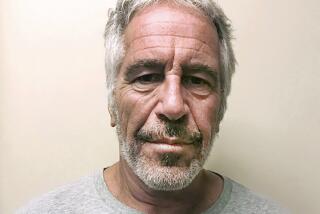Bomb Kills West German Bank Chief
- Share via
BAD HOMBURG, West Germany — A bomb today killed the powerful chairman of West Germany’s largest bank as he drove to work, and officials said the leftist Red Army Faction terrorist group claimed responsibility.
Deutsche Bank chief Alfred Herrhausen, 59, died in the explosion at about 8:30 a.m. in the affluent Frankfurt suburb of Bad Homburg, where he lived.
Chancellor Helmut Kohl, his eyes filled with tears and his voice breaking, condemned the slaying as “a cowardly and brutal murder.”
Herrhausen, probably the best-known figure in West Germany’s business world, often advised Kohl and frequently accompanied the chancellor on his foreign trips.
The chief federal prosecutor’s office said the Red Army Faction, which has carried out numerous terrorist attacks in West Germany, claimed responsibility in a letter found at the scene of the attack. It was the first known Red Army attack in more than three years.
Police officials said the blast lifted Herrhausen’s armored BMW into the air, consuming it in a ball of fire.
The Deutsche Bank and the chief federal prosecutor’s office said Herrhausen’s driver was alive but suffered serious injuries.
Prosecutor’s spokesman Hans-Juergen Foerster said it appeared a remote-controlled detonating device set off explosives placed in the car’s path.
An Interior Ministry spokesman, Siegbert Seitz, said Herrhausen was considered a top target of leftist terrorists because of the investment policies of his bank.
Herrhausen led the Deutsche Bank on an aggressive expansion course aimed at making the institution one of the top 10 or 15 banks in the world.
His key role in forging a mammoth merger between car makers Daimler-Benz, already West Germany’s largest company, and the aerospace concern Messerschmidt-Boelkow-Blohm GmbH (MBB) fanned controversy over the bank’s role in the economy. It also sparked angry allegations by the political left that he was helping to create a powerful arms industry here.
Herrhausen strongly supported West German aid for the reformist governments in Poland and Hungary and promoted possible investment in rapidly changing East Germany.
More to Read
Sign up for Essential California
The most important California stories and recommendations in your inbox every morning.
You may occasionally receive promotional content from the Los Angeles Times.













